What Was The Pendleton Civil Service Act Intended To Reform
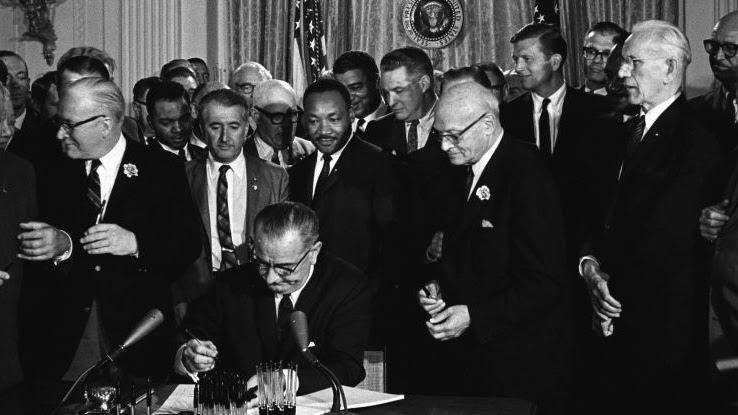
On June 15, 2020, the Supreme Court of the United States ruled on whether or non LGBTQ+ workers are protected from workplace discrimination under Title Seven of the Ceremonious Rights Act of 1964. For those unfamiliar with Title Vii, its language specifically "bars employment discrimination based on race, religion, national origin and sex" — and information technology grants protection based on gender identity and sexual orientation.
You might be wondering: How did a civil rights-era law from the 1960s end upwards at the heart of 1 of this decade'south first Supreme Court rulings on LGBTQ+ rights? Well, to empathize the full scope — and the lasting scope — of the Ceremonious Rights Act of 1964'due south history, information technology'due south important to look dorsum at its beginnings and understand what led upward to its momentous enactment.
How Did the Civil Rights Act of 1964 Come up to Be?
Following the end of the Civil War, the 13th, 14th and 15th Amendments were passed in order to abolish slavery, grant formerly enslaved people U.S. citizenship and provide these new citizens the right to vote. However, in the decades that followed, numerous states, particularly those in the Southward, created untold "legal" obstructions, from literacy tests to grandfather clauses, to cease Black Americans from voting and exercising the rights that were codified in those amendments.
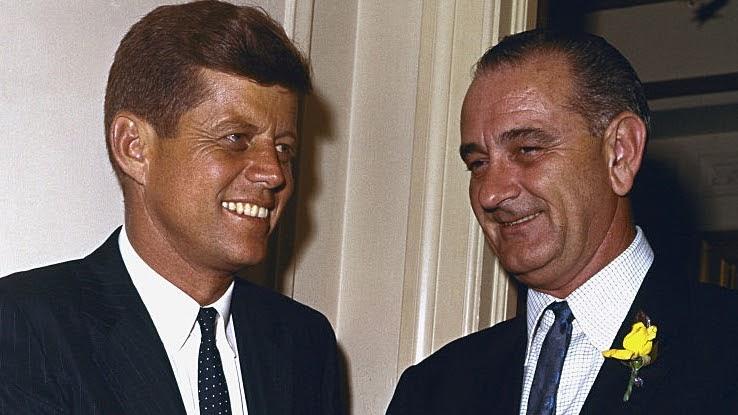
By the fourth dimension President John F. Kennedy entered the White House in 1961, Black leaders like Martin Luther King Jr., Rosa Parks and others fabricated it articulate that existent change was needed to protect Black Americans and their rights. At get-go, President Kennedy avoided any steps to stop segregation, only, by June of 1963, he outlined a civil rights bill that would non only finish segregation but likewise restore — and protect — Black Americans' correct to vote. When President Kennedy was assassinated on Nov 11 of the same year, his vice president and successor Lyndon B. Johnson vowed to pass the beak.
The Civil Rights Human activity of 1964 every bit nosotros know it today included numerous provisions: It banned voter registration requirements, like literacy tests and poll taxes, and aimed to end discrimination and segregation in public schools, merchandise unions, institutions that did business with the federal government and businesses that participate in interstate commerce. Additionally, the act also banned discrimination when it came to federal help plan eligibility.
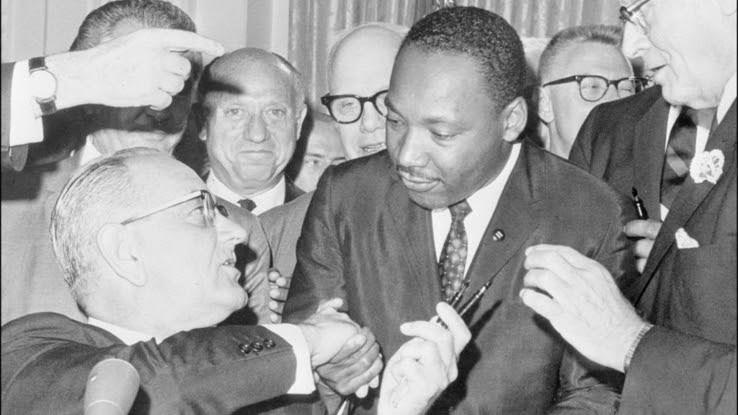
Opposition to the bill was tearing. Southern congressmen called information technology a violation of individual and state rights, and there were numerous attempts to sabotage the neb with and then-called "poisonous substance pill" amendments — additions to a law intended to plough other lawmakers against information technology. One such amendment was proposed past Congressman Howard Due west. Smith of Virginia. He opposed both segregation and women's rights but figured that, by introducing language into the bill banning discrimination based on sex activity equally well as race, color, religion and national origin, he could sink the bill.
Much to Smith's chagrin, President Johnson and Congress were adamant to pass the bill anyhow, despite shakier support for the linguistic communication based on sex. While a group of senators held the longest delay in U.S. history — 60 days in total — to prevent the bill from condign police force, deals were made behind the scenes to win over opponents, and the nib moved to Johnson's desk. Martin Luther King Jr., who was in the room with the president when he signed the bill into law, described that moment every bit "a second emancipation."
What Happened in the Wake of the Human action's Enactment?
Just because the bill passed, that didn't hateful all of the opposition suddenly vanished. In fact, in the wake of its enactment, the act was brought all the manner to the Supreme Court, where the justices confirmed it to be constitutional. As a result, white segregationists staged protests, committed acts of violence and voted a slew of pro-segregation lawmakers into function. Johnson, a Democrat, famously mused, "Information technology is an important gain, merely I think we but delivered the South to the Republican Party for a long time to come."
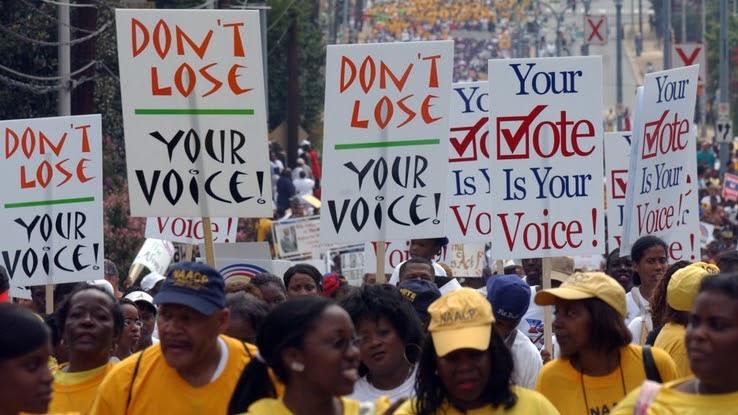
On the flip side, the law also led to the passage of further landmark pieces of legislation, including the Voting Rights Act of 1965, which further strengthened protections confronting discriminatory voting laws, and the Fair Housing Act of 1968, which fabricated discrimination in selling, renting or ownership property illegal. Eventually, the act itself was amended in gild to extend protections to seniors and disabled Americans, and, under Championship IX, women* gained protection from discrimination based on sex in education programs or activities that receive federal financial assistance, including sports.
*At the time of the subpoena's addition, the aim was to put men and women on equal footing, but, today, the Supreme Court's reading of the Civil Rights Act seems more poised to protect folks of all genders.
What Is the Act'south Legacy Today?
As mentioned in a higher place, the Supreme Court ruled on whether or not Title Vii protects LGBTQ+ workers from workplace discrimination. Thanks to the half dozen-3 majority ruling, Title Seven's language at present firmly applies to discrimination based on sexual orientation and gender identity. For the bulk, Justice Neil K. Gorsuch wrote, "An employer who fires an individual just for existence gay or transgender defies the constabulary."
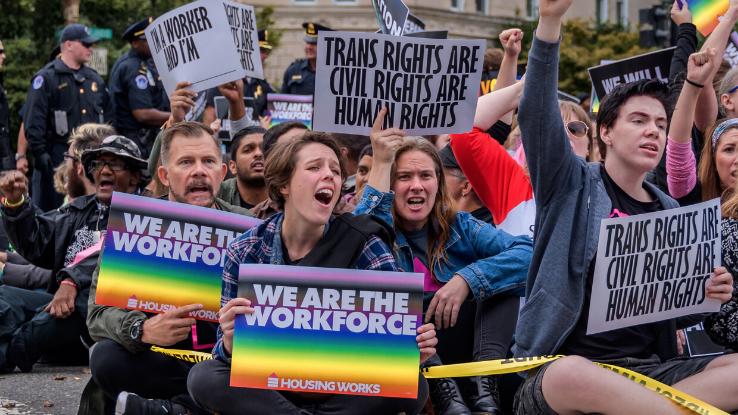
The ruling is a landmark for many reasons, but chief among them is that this was the first major case that outrightly protected transgender rights. Before, information technology was legal in more than than half of the states to fire workers for being gay, bisexual, transgender or queer. That is, fifty-fifty though gay marriage has been the law of the state since 2015, LGBTQ+ folks in some states could get married over the weekend — and then fired on Monday, simply for living openly and truthfully with their same-sexual activity spouse.
"This is a simple and profound victory for [LGBTQ+] civil rights," Columbia constabulary professor Suzanne B. Goldberg told The New York Times. "Many of us feared that the courtroom was poised to gut sex discrimination protections and allow employers to discriminate based on sexual orientation and gender identity, yet information technology declined the federal government'southward invitation to take that damaging path."
Of course, despite these victories, the Civil Rights Human activity of 1964 hasn't fully reconciled inequality in America. As the murder of George Floyd and many other Black Americans at the hands of police has shown, people in the U.s. yet get treated in fundamentally different ways based on pare colour. Additionally, inequality continues to stem from laws and practices that, in the past, expressly prevented Blackness Americans from owning property and making coin.
Additionally, the Civil Rights Act itself has also been weakened past certain court rulings, such equally Shelby County 5. Holder, wherein the court ruled that states and counties with a history of discriminatory voting laws no longer needed clearance from the federal government to change their voting laws. Needless to say, voter purges, stricter voter ID laws, rollbacks on early voting and registration and other forms of voter suppression emerged, making it harder for people of colour to vote. Despite these shortcomings, however, the Civil Rights Act of 1964 has cemented its place as a quintessential piece of legislation — 1 that aims to create a better life for all Americans, even if we still take quite a bit of piece of work to practise to make that vision a reality.
What Was The Pendleton Civil Service Act Intended To Reform,
Source: https://www.reference.com/history/what-was-civil-rights-act-1964?utm_content=params%3Ao%3D740005%26ad%3DdirN%26qo%3DserpIndex
Posted by: mcfarrentreasking.blogspot.com


0 Response to "What Was The Pendleton Civil Service Act Intended To Reform"
Post a Comment